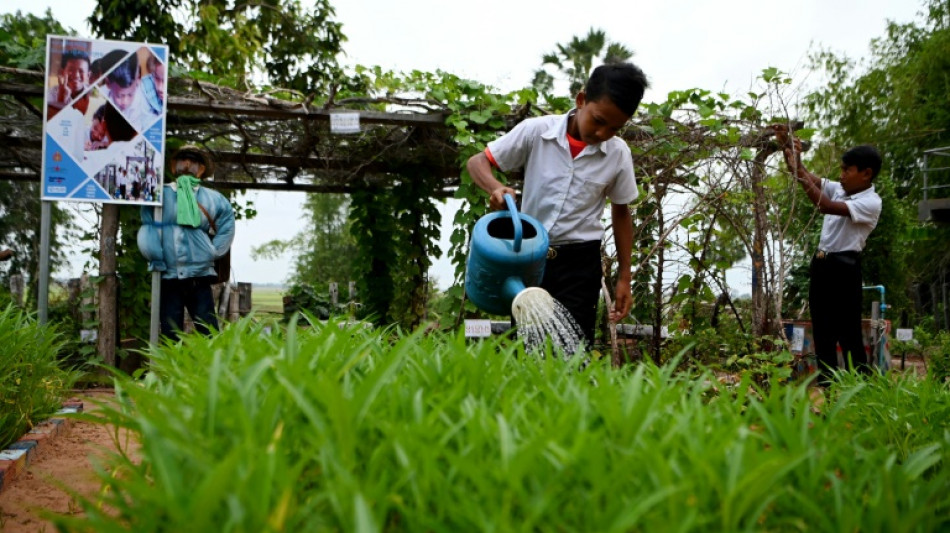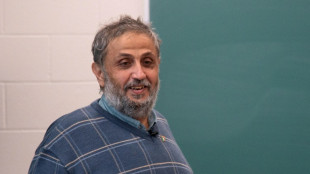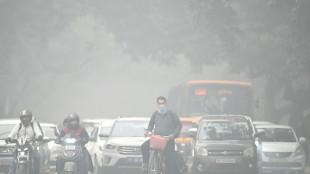
-
 Tunisia women herb harvesters struggle with drought and heat
Tunisia women herb harvesters struggle with drought and heat
-
Trump threatens to take back control of Panama Canal

-
 India's architecture fans guard Mumbai's Art Deco past
India's architecture fans guard Mumbai's Art Deco past
-
Secretive game developer codes hit 'Balatro' in Canadian prairie province

-
 Large earthquake hits battered Vanuatu
Large earthquake hits battered Vanuatu
-
Beaten Fury says Usyk got 'Christmas gift' from judges

-
 First Singaporean golfer at Masters hopes 'not be in awe' of heroes
First Singaporean golfer at Masters hopes 'not be in awe' of heroes
-
Usyk beats Fury in heavyweight championship rematch

-
 Stellantis backtracks on plan to lay off 1,100 at US Jeep plant
Stellantis backtracks on plan to lay off 1,100 at US Jeep plant
-
Atletico snatch late win at Barca to top La Liga

-
 Australian teen Konstas ready for Indian pace challenge
Australian teen Konstas ready for Indian pace challenge
-
Strong quake strikes off battered Vanuatu

-
 Tiger Woods and son Charlie share halfway lead in family event
Tiger Woods and son Charlie share halfway lead in family event
-
Bath stay out in front in Premiership as Bristol secure record win

-
 Mahomes shines as NFL-best Chiefs beat Texans to reach 14-1
Mahomes shines as NFL-best Chiefs beat Texans to reach 14-1
-
Suspect in deadly Christmas market attack railed against Islam, Germany

-
 MLB legend Henderson, career stolen base leader, dead at 65
MLB legend Henderson, career stolen base leader, dead at 65
-
Albania announces shutdown of TikTok for at least a year

-
 Laboured Napoli take top spot in Serie A
Laboured Napoli take top spot in Serie A
-
Schick hits four as Leverkusen close gap to Bayern on sombre weekend

-
 Calls for more safety measures after Croatia school stabbings
Calls for more safety measures after Croatia school stabbings
-
Jesus double lifts Christmas spirits for five-star Arsenal

-
 Frankfurt miss chance to close on Bayern as attack victims remembered
Frankfurt miss chance to close on Bayern as attack victims remembered
-
NBA fines Celtics coach Mazzulla and Nets center Claxton

-
 Banned Russian skater Valieva stars at Moscow ice gala
Banned Russian skater Valieva stars at Moscow ice gala
-
Leading try scorer Maqala takes Bayonne past Vannes in Top 14

-
 Struggling Southampton appoint Juric as new manager
Struggling Southampton appoint Juric as new manager
-
Villa heap pain on slumping Man City as Forest soar

-
 Suspect in deadly Christmas market attack railed against Islam and Germany
Suspect in deadly Christmas market attack railed against Islam and Germany
-
At least 32 die in bus accident in southeastern Brazil

-
 Freed activist Paul Watson vows to 'end whaling worldwide'
Freed activist Paul Watson vows to 'end whaling worldwide'
-
Chinese ship linked to severed Baltic Sea cables sets sail

-
 Sorrow and fury in German town after Christmas market attack
Sorrow and fury in German town after Christmas market attack
-
Guardiola vows Man City will regain confidence 'sooner or later' after another defeat

-
 Ukraine drone hits Russian high-rise 1,000km from frontline
Ukraine drone hits Russian high-rise 1,000km from frontline
-
Villa beat Man City to deepen Guardiola's pain

-
 'Perfect start' for ski great Vonn on World Cup return
'Perfect start' for ski great Vonn on World Cup return
-
Germany mourns five killed, hundreds wounded in Christmas market attack

-
 Odermatt soars to Val Gardena downhill win
Odermatt soars to Val Gardena downhill win
-
Mbappe's adaptation period over: Real Madrid's Ancelotti

-
 France's most powerful nuclear reactor finally comes on stream
France's most powerful nuclear reactor finally comes on stream
-
Ski great Vonn finishes 14th on World Cup return

-
 Scholz visits site of deadly Christmas market attack
Scholz visits site of deadly Christmas market attack
-
Heavyweight foes Usyk, Fury set for titanic rematch

-
 Drone attack hits Russian city 1,000km from Ukraine frontier
Drone attack hits Russian city 1,000km from Ukraine frontier
-
Former England winger Eastham dies aged 88

-
 Pakistan Taliban claim raid killing 16 soldiers
Pakistan Taliban claim raid killing 16 soldiers
-
Pakistan military courts convict 25 of pro-Khan unrest

-
 US Congress passes bill to avert shutdown
US Congress passes bill to avert shutdown
-
Sierra Leone student tackles toxic air pollution


School gardens a lifeline for hungry Cambodian children
Among the spinach crops at a rural Cambodian school garden, children test their maths skills while weighing produce -- but as food prices rise, the vegetable patch has become a safety net for struggling families.
Long before Covid restrictions ravaged the economy, malnutrition and poverty stalked Cambodia's youth -- the legacy of decades of conflict and instability following the Khmer Rouge's genocidal rule in the 1970s.
Food insecurity has worsened since Russia's invasion of Ukraine stoked global shortages and inflation.
The World Food Programme (WFP) says the prices of local staples have shot up in the past year: duck eggs by more than 20 percent and cooking oil by almost 40 percent.
Noodle seller Chhon Puthy, 31, has lost half her income during the pandemic and worries about her children's health.
"We parents had to reduce our rations sometimes," said the mother-of-two from the village of Chroy Neang Nguon, about two hours from Siem Reap.
In recent months, her family has come to rely on the garden and free breakfast programme at her children's school to ease the financial pressure.
"This community depends on the meal because every morning parents are busy with farming and could not cook for their kids," she said.
- Garden lifeline -
Remote schools in Siem Reap province use the gardens to teach pupils life skills such as cultivation and cooking.
"I learn about growing vegetables, making organic fertiliser, how to work in soil," 12-year-old Seyha told AFP, adding that the know-how has helped improve her family's own vegetable patch.
More than 1,000 schools around Cambodia have meal programmes supported by the WFP, with around 50 learning gardens set up with help from global rights group Plan International.
Before each day's lessons, students are served a free breakfast of rice and fish soup with vegetables grown in the garden.
Long Tov, principal of the school in Chroy Neang Nguon, said the garden and meal programme helped improve students' concentration levels, memory and test results.
"It (also) hugely reduces the school dropout rate," he told AFP.
Vireak, 12, said he was happy to eat at school with his classmates.
"I feel stronger and smarter and I can learn things much easier than before," he said.
- Impact -
Malnutrition costs the Cambodian economy more than $400 million a year -- about 2.5 percent of GDP -- according to a study backed by UNICEF.
The country has made progress on tackling the issue -- chronic malnutrition in children under five fell from 32 percent in 2014 to 22 percent -- but there are fears that inflation could stall momentum.
"Rising food prices are likely to exacerbate the already high levels of childhood malnutrition, just as the country started showing signs of recuperating from the pandemic's economic impacts," the United Nations Nutrition office in Cambodia said in a statement.
At Angkor Hospital for Children in Siem Reap, nutrition team leader Sroeu Phannsy told AFP that some poor families were being forced to water down infant milk formula, which can have devastating consequences for a baby's health.
The fight against malnutrition takes her team of health workers into remote areas, where they treat children with ready-to-eat, energy-dense snacks.
"We worry about their growth in the future, particularly their brain development will be weakened as they prepare to go to school at the age of five or six," she said.
Children and infants not receiving enough nutrients can go on to suffer low IQs, blindness, stunted growth and weak immune systems.
Back at the learning garden, a teacher shows a class, with full bellies after breakfast, when vegetables are ready to harvest.
"In the learning garden, we are happy and learn important skills... Back home I grow morning glory, cucumber, beans and tomatoes," 12-year-old Vireak said.
E.Paulino--PC



